The Great McGinty

Brief Synopsis
Cast & Crew
Preston Sturges
Brian Donlevy
Muriel Angelus
Akim Tamiroff
Allyn Joslyn
William Demarest
Film Details
Technical Specs

Synopsis
When Thompson, a despondent bank cashier, tries to commit suicide in a south of the border dive because he ruined his life with one crazy moment of dishonesty, he is rescued by the bartender, who relates the story of how one crazy moment of honesty caused his fall from governor of a state to bartender. Dan McGinty's climb to electoral glory begins at a soup kitchen where he is recruited by a crooked politician to vote in various precincts under the names of recently deceased voters for the machine-run mayor. Impressed by McGinty's skill in voting thirty-seven times, as well as his lack of scruples, the political boss welcomes him to the party, and McGinty soon rises from extortion man to alderman. To win the post of mayor, McGinty enters into a business arrangement to marry his secretary, Catherine, and thus dons the mantle of respectability by becoming father to her two children. Six months into the marriage, however, the newlyweds fall in love, and McGinty discovers that his new role as family man and the urgings of his wife instill a sense of honor and decency in him. Elected governor, McGinty informs the Boss that he is through with the party, and when the enraged Boss tries to murder the new governor, he is arrested. Meanwhile, the party, learning of the double cross, exposes McGinty's corruption, and as a result, he, too, is thrown in jail. Imprisoned in adjoining cells, the governor and the Boss begin to argue when the Politician, disguised as a guard, breaks them out of jail. After calling his tearful wife to tell her where he has hidden the money for her and the children, McGinty and the others flee the country. After McGinty's story ends, Thompson has a change of heart, and McGinty goes back to tending bar, aided by the Boss and the Politician.

Director

Preston Sturges
Cast

Brian Donlevy

Muriel Angelus

Akim Tamiroff
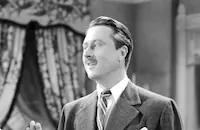
Allyn Joslyn

William Demarest

Louis Jean Heydt
Harry Rosenthal
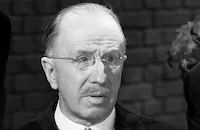
Arthur Hoyt
Libby Taylor
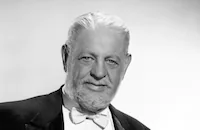
Thurston Hall

Steffi Duna
Esther Howard
Frank C. Moran
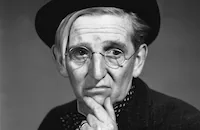
Jimmy Conlin
Dewey Robinson

Richard Carle
Donnie Kerr
Mary Thomas
Drew Roddy
Sheila Sheldon
Pauline Drake
William Edmunds
Charles Moore
Kay Stewart
Jean Phillips
Emory Parnell
Lee Shumway
Victor Potel
Harry Hayden
Walter Soderling
Pat West
Edward Cassidy
Sammy Blum
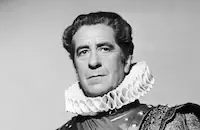
Robert Warwick
Enrique Orona

Byron Foulger

Wanda Mckay
Paul Newland
Lorimer Johnston
George Melford
Charles Mcavoy
C. L. Sherwood
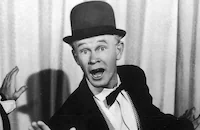
Billy Benedict
J. Sinclair
Duke Green
George Anderson
Dorothy Vernon

Sylvia Andrew
Bessie Wade
Betty Farrington
Crew
Eddie Adams
Adele Balkin
Neal Beckner
Hugh Bennett
Ted Bonnett
Richard Brandow
Arnold Braun
E. L. Calkins
John Chevez
Pat Cummings
Hans Dreier
Art Elliott
A. E. Freudeman
Adolph Froelich
Alvin Ganzer
Art Hadley
Lee Hall
Earl Hayman
Edith Head
Bill Heckler
Earl Hedrick
David Hire
Frederick Hollander
Max Hutchinson
Gana Jones
Paul Jones
Howard Joslin
Bill Kubitz
Ernst Laemmle
Hilmer Larsen
Oscar Lau
William Lebaron
Jack Lefferman
Florence Lyons
Nellie Manley
Bob Mayo
William Mellor
R. W. Nelson
Walter Oberst
Richard Olson
Gordon Rayburn
G. E. Richardson
Don Robb
Roy Roberts
Gus Rush
Troy Sanders
Steve Seymour
Henry Shuster
Preston Sturges
George Templeton
Frank Thayer
Darrell Turnmire
Buck Walters
Dewey Wrigley

Photo Collections
Videos
Movie Clip


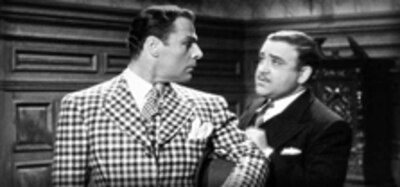

Trailer
Hosted Intro



Promo
Film Details
Technical Specs

Award Wins
Best Writing, Screenplay
Articles
The Great McGinty
An enterprising bum who knows how to work the angles, McGinty is a soup kitchen hobo paid a measly fee of two dollars by a corrupt political boss to vote for his shyster mayoral candidate. When McGinty votes not once, but 37 times, he catches the eye of The Boss (Akim Tamiroff), who is impressed by McGinty's flinty, hard-edged can-do attitude. McGinty quickly rises through the ranks of New York's politically corrupt, from bill collector to alderman to mayor to governor. Encouraged to boost the women's vote and present an image of all-American family man to his constituents, McGinty even marries his secretary, Catherine (Muriel Angelus), a divorcee with two children, and takes up residence with his ready-made faux-family in a luxurious apartment. But the sham family begins to tug at McGinty's heartstrings and soon Catherine has the one-time hood speaking out against social injustice, graft and child labor, thus alienating his would-be puppetmaster. McGinty's political downfall soon follows in Preston Sturges' wry satire of political graft full of crackling tough-guy dialogue. The transformation of the gruff, working-class palooka McGinty into a beloved, sharp-dressed politico is in itself a stinging indictment of the show-biz aspects of politics.
By the late thirties, Sturges had already distinguished himself in Hollywood as a writer of remarkable wit and sophistication. By the time he penned The Great McGinty, Sturges was the highest-paid scribe in Hollywood, renowned for his sparkling dialogue and elegantly crafted stories. But the adaptations of his scripts for films like Easy Living (1937) and Diamond Jim (1935) to the screen were displeasing to Sturges, far from the tone he aimed for in his writing.
Sturges longed to direct one of his own scripts, and finally convinced reluctant Paramount executives to let him direct by selling the studio the McGinty screenplay for a mere $10 on the condition that he serve as director. Despite Paramount's initial anxiety about the marketability of a political satire, The Great McGinty turned out to be a surprisingly deft first effort that challenges some of the feel-good political Americana of Frank Capra's Mr. Smith Goes to Washington (1939). And despite some significant stumbling blocks, like a three-week shooting schedule and a relatively meager $350,000 budget, McGinty turned out to be an acrobatic, lively surprise hit at the box office and with critics. And because writer-directors were contrary to the departmentalized operations of the classical Hollywood studio system, Sturges' success in wearing two hats proved highly influential for other talented writers anxious to make their first foray into direction, like John Huston and Billy Wilder, who followed in Sturges' footsteps.
Sturges' ability to transform himself from a highly successful writer into an equally renowned director of such cinematic favorites as Sullivan's Travels (1941), The Miracle of Morgan's Creek (1944) and Hail the Conquering Hero (1944) was just another demonstration of his many creative metamorphoses. A child of wealth who was educated in France, Germany and Switzerland, Sturges first worked in his mother's cosmetics firm, later invented a kissproof lipstick, tried his hand as an inventor, then as a playwright, but found his ultimate creative expression as a remarkably successful screenwriter and director.
Producer: Paul Jones
Director: Preston Sturges
Screenplay: Preston Sturges
Cinematography: William C. Mellor
Production Design: Hans Dreier, A. Earl Hedrick
Music: Frederick Hollander
Cast: Brian Donlevy (Daniel "Dan" McGinty), Muriel Angelus (Catherine McGinty), Akim Tamiroff (The Boss), William Demarest (The Politician), Allyn Joslyn (George).
BW-82m.
by Felicia Feaster

The Great McGinty
Quotes
If it wasn't for graft, you'd get a very low type of people in politics, men without ambition, jellyfish!- The Politician
"This is the story of two men who met in a banana republic. One of them never did anything dishonest in his life except for one crazy minute. The other never did anything honest in his life except for one crazy minute. They both had to get out of the country."- Prologue
Trivia
On August 19, 1939, Paramount issued a check to contract writer Preston Sturges to buy the story and screenplay of this movie, in the amount of $10. Sturges promised to sell the script for that amount if he could direct. The studio took him up on it and the film was a hit and won an Academy Award for the screenplay, probably making it the cheapest Oscar-winning script in history.
Other titles for this project were "Biography of a Bum" and "Down Went McGinty".
Sturges got the idea for this film from a Chicago area judge who shared stories with him about city elections.
Notes
The working titles of this film were Down Went McGinty, The Story of a Man, The Vagrant, The Mantle of Dignity and The Biography of a Bum. It marked Preston Sturges' directorial debut. According to materials contained in the Preston Sturges Files at the UCLA Library, Sturges wrote the original story, entitled "The Story of a Man," in 1933 with Spencer Tracy in mind. He tried to sell it to Universal in 1935, and in 1938, he tried to sell the story, retitled "Biography of a Bum," to Saturday Evening Post. When that magazine refused the story, Sturges sold it to Paramount for ten dollars on the condition that he be allowed to direct it. The film began production on December 15, 1939 and closed down on January 25, 1940 with one day left to shoot. The final scenes were shot on April 15, 1940, after the first cut had been made. According to a news item in Hollywood Reporter, the production of this film was postponed to allow Akim Tamiroff to appear in The Way of All Flesh. During filming, Sturges was stricken with pneumonia and, as a result, needed a private nurse on the set with him. Correspondence in the Preston Sturges Papers notes that Jo Ann Sayers was borrowed from M-G-M to play the female lead opposite Brain Donlevy, but was declared incompetent and consequently was dropped. The Los Angeles Herald Express and Hollywood Reporter add that Paramount tried to borrow Joseph Schildkraut for a role in this film. Sturges won an Academy Award for Best Original Screenplay for this picture. The picture was also included in FD's "ten best" films of 1940. In 1942, Brian Donlevy starred in a Philip Morris Playhouse version of the story on the CBS radio network. In 1942, Brian Donlevy and Akim Tamiroff reprised their roles of Dan McGinty and The Boss in Sturges's The Miracle of Morgan's Creek. In 1950, Paramount considered remaking the film with Bing Crosby, and in 1954 with Bob Hope, but dropped the project.

Miscellaneous Notes
Released in United States 1940
Released in United States 1974
Released in United States June 1990
Released in United States on Video April 7, 1988
Re-released in United States on Video June 30, 1993
Shown at Sydney Film Festival June 8-22, 1990.
Released in United States 1940
Released in United States 1974 (Shown at FILMEX: Los Angeles International Film Exposition (The Preston Sturges Movie Marathon) March 28 - April 9, 1974)
Sturges sold this script to Paramount for $1 for the chance to direct it. It went on to win the first Oscar ever awarded for Best Original Screenplay.
Released in United States on Video April 7, 1988
Released in United States June 1990 (Shown at Sydney Film Festival June 8-22, 1990.)
Re-released in United States on Video June 30, 1993















